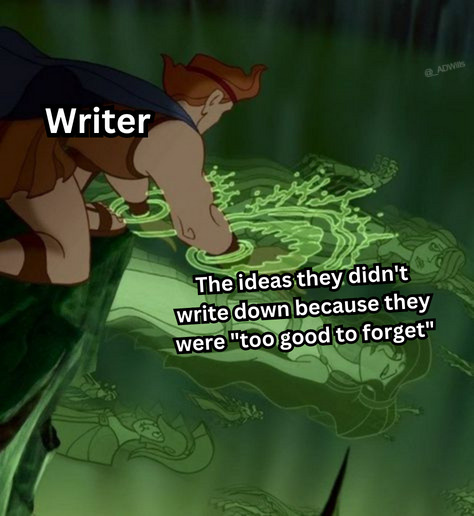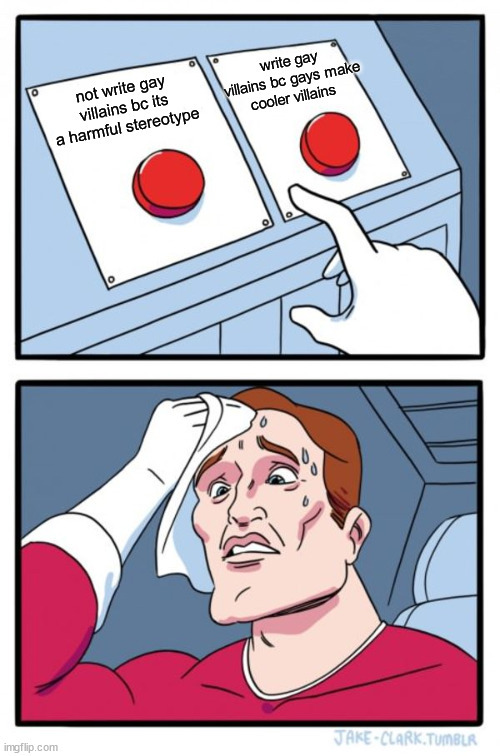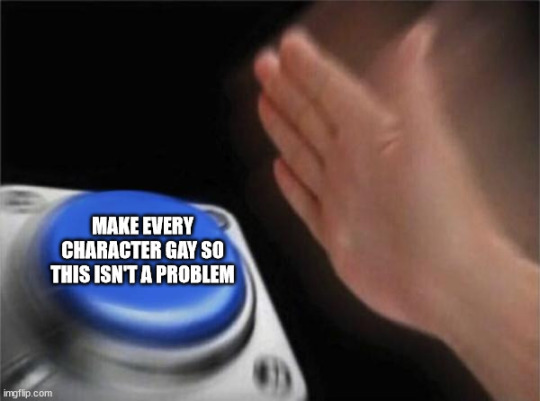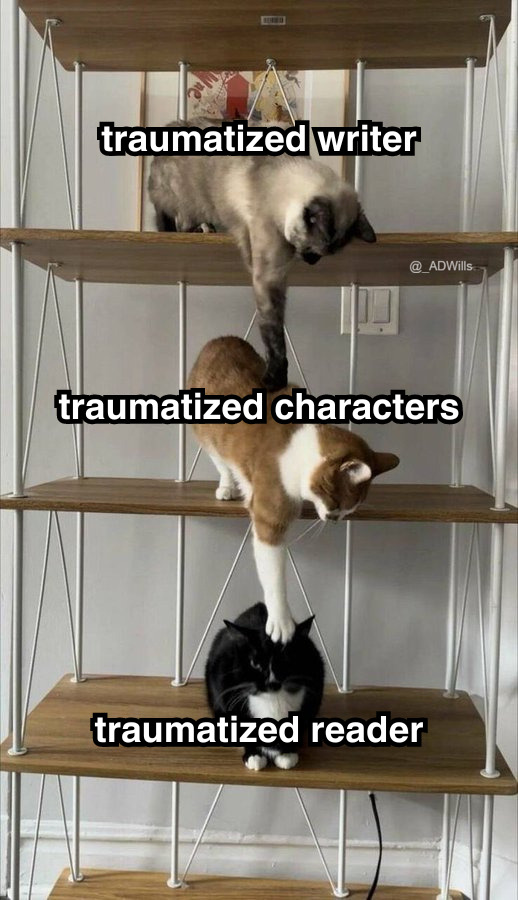Text
Things That May Be Causing Your Writer's Block- and How to Beat Them
I don't like the term 'Writer's Block' - not because it isn't real, but because the term is so vague that it's useless. Hundreds of issues all get lumped together under this one umbrella, making writer's block seem like this all-powerful boogeyman that's impossible to beat. Worse yet, it leaves people giving and receiving advice that is completely ineffective because people often don't realize they're talking about entirely different issues.
In my experience, the key to beating writer's block is figuring out what the block even is, so I put together a list of Actual Reasons why you may be struggling to write:
(note that any case of writer's block is usually a mix of two or more)
Perfectionism (most common)
What it looks like:
You write one sentence and spend the next hour googling "synonyms for ___"
Write. Erase. Write. Rewrite. Erase.
Should I even start writing this scene when I haven't figured out this one specific detail yet?
I hate everything I write
Cringing while writing
My first draft must be perfect, or else I'm a terrible writer
Things that can help:
Give yourself permission to suck
Keep in mind that nothing you write is going to be perfect, especially your first draft
Think of writing your first/early drafts not as writing, but sketching out a loose foundation to build upon later
People write multiple drafts for a reason: write now, edit later
Stop googling synonyms and save that for editing
Write with a pen to reduce temptation to erase
Embrace leaving blank spaces in your writing when you can't think of the right word, name, or detail
It's okay if your writing sucks. We all suck at some point. Embrace the growth mindset, and focus on getting words on a page
Lack of inspiration (easiest to fix)
What it looks like:
Head empty, no ideas
What do I even write about???
I don't have a plot, I just have an image
Want to write but no story to write
Things that can help:
Google writing prompts
If writing prompts aren't your thing, instead try thinking about what kind of tropes/genres/story elements you would like to try out
Instead of thinking about the story you would like to write, think about the story you would like to read, and write that
It's okay if you don't have a fully fleshed out story idea. Even if it's just an image or a line of dialogue, it's okay to write that. A story may or may not come out of it, but at least you got the creative juices flowing
Stop writing. Step away from your desk and let yourself naturally get inspired. Go for a walk, read a book, travel, play video games, research history, etc. Don't force ideas, but do open up your mind to them
If you're like me, world-building may come more naturally than plotting. Design the world first and let the story come later
Boredom/Understimulation (lost the flow)
What it looks like:
I know I should be writing but uugggghhhh I just can'tttttt
Writing words feels like pulling teeth
I started writing, but then I got bored/distracted
I enjoy the idea of writing, but the actual process makes me want to throw my laptop out the window
Things that can help:
Introduce stimulation: snacks, beverages, gum, music such as lo-fi, blankets, decorate your writing space, get a clickity-clackity keyboard, etc.
Add variety: write in a new location, try a new idea/different story for a day or so, switch up how you write (pen and paper vs. computer) or try voice recording or speech-to-text
Gamify writing: create an arbitrary challenge, such as trying to see how many words you can write in a set time and try to beat your high score
Find a writing buddy or join a writer's group
Give yourself a reward for every writing milestone, even if it's just writing a paragraph
Ask yourself whether this project you're working on is something you really want to be doing, and be honest with your answer
Intimidation/Procrastination (often related to perfectionism, but not always)
What it looks like:
I was feeling really motivated to write, but then I opened my laptop
I don't even know where to start
I love writing, but I can never seem to get started
I'll write tomorrow. I mean next week. Next month? Next month, I swear (doesn't write next month)
Can't find the time or energy
Unreasonable expectations (I should be able to write 10,000 words a day, right????)
Feeling discouraged and wondering why I'm even trying
Things that can help:
Follow the 2 min rule (or the 1 paragraph rule, which works better for me): whenever you sit down to write, tell yourself that you are only going to write for 2 minutes. If you feel like continuing once the 2 mins are up, go for it! Otherwise, stop. Force yourself to start but DO NOT force yourself to continue unless you feel like it. The more often you do this, the easier it will be to get started
Make getting started as easy as possible (i.e. minimize barriers: if getting up to get a notebook is stopping you from getting started, then write in the notes app of your phone)
Commit to a routine that will work for you. Baby steps are important here. Go with something that feels reasonable: every day, every other day, once a week, twice a week, and use cues to help you remember to start. If you chose a set time to write, just make sure that it's a time that feels natural to you- i.e. don't force yourself to writing at 9am every morning if you're not a morning person
Find a friend or a writing buddy you can trust and talk it out or share a piece of work you're proud of. Sometimes we just get a bit bogged down by criticism- either internal or external- and need a few words of encouragement
The Problem's Not You, It's Your Story (or Outline (or Process))
What it looks like:
I have no problems writing other scenes, it's just this scene
I started writing, but now I have no idea where I'm going
I don't think I'm doing this right
What's an outline?
Drowning in documents
This. Doesn't. Make. Sense. How do I get from this plot point to this one?!?!?! (this ColeyDoesThings quote lives in my head rent free cause BOY have I been there)
Things That Can Help:
Go back to the drawing board. Really try to get at the root of why a scene or story isn't working
A part of growing as a writer is learning when to kill your darlings. Sometimes you're trying to force an idea or scene that just doesn't work and you need to let it go
If you don't have an outline, write one
If you have an outline and it isn't working, rewrite it, or look up different ways to structure it
You may be trying to write as a pantser when you're really a plotter or vice versa. Experiment with different writing processes and see what feels most natural
Study story structures, starting with the three act structure. Even if you don't use them, you should know them
Check out Ellen Brock on YouTube. She's a professional novel editor who has a lot of advice on writing strategies for different types of writers
Also check out Savage Books on YouTube (another professional story editor) for advice on story structure and dialogue. Seriously, I cannot recommend this guy enough
Executive Dysfunction, Usually From ADHD/Autism
What it looks like:
Everything in boredom/understimulation
Everything in intimidation/procrastination
You have been diagnosed with and/or have symptoms of ADHD/Autism
Things that can help:
If you haven't already, seek a diagnosis or professional treatment
Hire an ADHD coach or other specialist that can help you work with your brain (I use Shimmer; feel free to DM me for a referral)
Seek out neurodiverse communities for advice and support
Try body doubling! There's lot's of free online body doubling websites out there for you to try. If social anxiety is a barrier, start out with writing streams such as katecavanaughwrites on Twitch
Be aware of any sensory barriers that may be getting in the way of you writing (such as an uncomfortable desk chair, harsh lighting, bad sounds)
And Lastly, Burnout, Depression, or Other Mental Illness
What it looks like:
You have symptoms of burnout or depression
Struggling with all things, not just writing
It's more than a lack of inspiration- the spark is just dead
Things that can help:
Forget writing for now. Focus on healing first.
Seek professional help
If you feel like it, use writing as a way to explore your feelings. It can take the form of journaling, poetry, an abstract reflection of your thoughts, narrative essays, or exploring what you're feeling through your fictional characters. The last two helped me rediscover my love of writing after I thought years of depression had killed it for good. Just don't force yourself to do so, and stop if it takes you to a darker place instead of feeling cathartic
18K notes
·
View notes
Text
How to get to know your characters better?
(feel free to add your own thoughts to this list, hope it helps!) req by @miricalebabyy44 <3
what will your character be like if they were in your shoes?
is your oc the mom friend or the dad or the childish one in their friendgroup ?
do those "poet, king, soldier" quiz for your oc. im being fr
do the "36 questions to fall in love" quiz as your oc.
ik your ocs trauma have an impact on their character, but how would they be like, if they hadn't gone through that experience?
does your oc have similar tastes as you do? (music, art, fashion, coffee/tea etctetc)
will they "i only live once so I'll do it for the plot." or will they "i only live once ffs, i don't wanna die." ?
what is your ocs opinion of love? how is/was their love life on a scale of 1-10?
will your oc let go of someone precious to them when they know they're putting them at danger?
around whom does your oc lets their guard down?
are they romantically constipated or a hopeless romantic?
what type of music does ur oc like?
write a lot about your oc if you're struggling to get to know them. find a drabble prompt, and write what they'd do.
do they trust others easily or do they get trusted by others easily?
what is something your oc will never talk to anyone about? (their answer can be deep, like some emo trauma or like smthng like back when they shit their pants or smthng yk)
do they give off golden retriever energy, or a black cat energy? (or both?)
what will THEIR opinion be on YOUR current life? will they be ur friend? will they trust you?
will your oc survive in a fantasy setting, a war setting, a dystopian setting, a futuristic setting, a medieval setting? will ur oc survive after getting stranded on an island, or a forest?
does your oc like their parents, do they like how their life is, do they feel like they're born in the right gen?
if they are ever to get one wish definitely granted, what would they wish for?
how did they react to their first kiss? (if they have had it by now lmao)
what's an ideal day for your oc?
lastly, who does your oc go to when they've fucked up?
8K notes
·
View notes
Text
one of the best fics i've ever read, one that had me addicted to my phone and crying, wasn't even prose. it was a huge, casual, bullet-pointed outline with every detail of an au that the author never got around to writing in full. and it was amazing.
let this be a message to all you who want to write but can't do it "normally": write it! someone out there will eat it up. whether that be poetry, tiny drabbles, or bullet pointed list: your work is always worth it. your art (yes, art!) will alway deserve to have its moment in the spotlight. why? because you made it. even if it wasn't done in a traditional matter, it came from your brain and your creativity and that is amazing.
♡
20K notes
·
View notes
Text
Part 2 of "English Is Hard", the series where I talk about all the annoying details that can make writing a living Hell
Capitalising formal titles.
Oh, God, this one is a doozey.
It can be incredibly difficult to know when you're supposed to capitalise a person's title, especially when you're a new writer or working with characters in a more formal setting for the first time. Here are the tips I use to figure it out myself!
As a general rule, if the sentence would still make sense if the title was replaced with the character's first name, it needs to be capitalised. I've included a couple of examples below to properly explain.
After several moments, the Empress walked away, scowling.
After several moments, Alexandra walked away, scowling.
In this example, "the Empress" could be replaced with the character's first name, and the sentence would still be completely correct, so her title is capitalised.
"She does not want to be an empress, she wants to be normal."
"She does not want to be Alexandra, she wants to be normal."
In this case, although still referring to Alexandra's status as an empress, switching the title with her name does not make sense. This example is referring purely to the position, and not to the individual herself. Hence, it does not need to be capitalised.
Actually, that's another good way of summing it up: if referring to a specific individual, the title should be capitalised, but if referring to merely the position itself, it does not need to be.
A few more examples to expand on this:
Sadly, Queen Elizabeth passed away in 2022.
(the title could be replaced with just the first name and the sentence would still make sense)
Born in 1738, George became king in late 1760.
(the sentence refers to the position of king)
The Prince scurried past, giggling to himself.
He was a very important individual- the president, no less.
Now, when it comes to titles such as "sir" and "madam", the rule is a little different, but not terribly so. These should be capitalised if they are part of a title (eg. "Sir David Attenborough" or "Madam Pomfrey"), but should otherwise be left uncapitalised.
"May I present Sir William Lucas?"
("Sir" in this case is part of William Lucas' official title, and should be capitalised)
"I did not mean any offence, sir."
(in this example, "sir" is not part of a formal title, and does not need to be capitalised, even if the person was speaking to Sir William Lucas)
Madam Pomfrey was chronically overworked and underappreciated,
"I saw a young madam by the lake not long ago, she looked to be stressed."
There are so many other tidbits related to this, so many that I think I may even have to do another post further explaining all the nuances and finer details. Honestly, I could do an entire part just explaining when and how to capitalise family titles. There are a few things I've missed here, and more than likely exceptions to the rules that I've failed to mention, but I hope that this basic guide will help at least a bit.
129 notes
·
View notes
Text
From instructions on how to opt out, look at the official staff post on the topic. It also gives more information on Tumblr's new policies. If you are opting out, remember to opt out each separate blog individually.
Please reblog this post, so it will get more votes!
47K notes
·
View notes
Text
Some tips for using a few words to describe voices:
1. Tone Words: Use tone words to convey the emotional quality of a voice. For example, you can describe a voice as "melodic," "soothing," "sharp," "gentle," or "commanding" to give readers a sense of the tone.
2. Pitch and Range: Mention the pitch and range of the voice. Is it "deep," "high-pitched," "raspy," or "full-bodied"? This can provide insight into the character's age, gender, or emotional state.
3. Accent and Diction: Describe the character's accent or diction briefly to give a sense of their background or cultural influences. For instance, "British-accented," "Southern drawl," or "formal."
4. Volume: Mention the volume of the voice, whether it's "whispering," "booming," "murmuring," or "hushed."
5. Quality: Use terms like "velvet," "silken," "gravelly," "honeyed," or "crisp" to convey the texture or quality of the voice.
6. Rate of Speech: Describe how fast or slow the character speaks, using words like "rapid," "slurred," "measured," or "rambling."
7. Mood or Emotion: Indicate the mood or emotion carried by the voice. For example, a "quivering" voice may convey fear or anxiety, while a "warm" voice may express comfort and reassurance.
8. Resonance: Describe the resonance of the voice, such as "echoing," "nasal," "booming," or "tinny."
9. Timbre: Mention the timbre of the voice, using words like "rich," "thin," "clear," or "smoky."
10. Cadence: Highlight the rhythm or cadence of speech with descriptors like "staccato," "lilting," "rhythmic," or "halting."
11. Intonation: Convey the character's intonation by saying their voice is "sarcastic," "apologetic," "confident," or "questioning."
12. Vocal Characteristics: If applicable, mention unique vocal characteristics, like a "lisp," "stutter," "drawl," or "accented 'r'."
22K notes
·
View notes
Text
show, don't tell:
anticipation
- bouncing legs
- darting eyes
- breathing deeply
- useless / mindless tasks
- eyes on the clock
- checking and re-checking
frustration
- grumbling
- heavy footsteps
- hot flush
- narrowed eyes
- pointing fingers
- pacing / stomping
sadness
- eyes filling up with tears
- blinking quickly
- hiccuped breaths
- face turned away
- red / burning cheeks
- short sentences with gulps
happiness
- smiling / cheeks hurting
- animated
- chest hurts from laughing
- rapid movements
- eye contact
- quick speaking
boredom
- complaining
- sighing
- grumbling
- pacing
- leg bouncing
- picking at nails
fear
- quick heartbeat
- shaking / clammy hands
- pinching self
- tuck away
- closing eyes
- clenched hands
disappointment
- no eye contact
- hard swallow
- clenched hands
- tears, occasionally
- mhm-hmm
tiredness
- spacing out
- eyes closing
- nodding head absently
- long sighs
- no eye contact
- grim smile
confidence
- prolonged eye contact
- appreciates instead of apologizing
- active listening
- shoulders back
- micro reactions
93K notes
·
View notes
Text
ALL THE TIME
You ever start writing something and it turns out so much darker then expected and your just like “you okay in there?” to yourself or is it just me?
#┊♪┊. soren's reblogs#i literally JUST did this last night#i have some new ocs and i was giving them backstories#and oh fuck#i feel so bad#like soren are you Okay#what even#how di d you COME UP with this
10K notes
·
View notes
Text

don't leave me!
81K notes
·
View notes
Text


#┊♪┊. soren's reblogs#ME#all my ocs#i do not think a single one of my ocs is cishet#i know ive got cis ocs#i know ive got like... at least oen straight oc#but None of them are allocishet#shoutout to nico hes literally so gay
47K notes
·
View notes
Text
the problem with reading and writing leading to a strong vocabulary is that you tend to know the vibe of words instead of their meanings.
if I used this word in a sentence, would it make sense? absolutely. if you asked me what it meant, could I tell you? absolutely not.
#┊♪┊. soren's reblogs#THIS#even for the most basic of words i be double checkign the dictionary#like “??? does this mean what ithink it does”#i have embarrassed myself one too many times
134K notes
·
View notes
Text
plotting as we speak rn...
im in class rn but i have these ocs who're inspired by soramafuurasaka, and im considering making ocs based on the other utaites too... like i am actually so tempted
SO tempted..
#┊♪┊. soren's rambles#self indulgent post#rambling#writers on tumblr#utaite#idk if i should tag this#but im gonna anyway
0 notes
Text
Reblog to let prev know you're proud of how far they've come and that they are deserving of love and care.
#┊♪┊. soren's reblogs#i know nobody follows yet#but if anyone sees this#im so proud of you#even if i dont know you or weve never spoken#even if weve never spoken and never will#give yourself some credit#because the fact youve survived for so long is incredible#you lived through all of that and youre still here#be proud of yourself
2K notes
·
View notes
Text
tfw you're writing side character profiles and you accidentally get attached to them
#writers on tumblr#writer struggles#writing problems#writer community#writing#writeblr#writerscommunity#the struggle is real#sigh...
9 notes
·
View notes
Text
When someone dies, the afterlife they go to is determined by WHERE they died. Dying in Scandinavia sends the soul to Valhalla or Hel, but dying in Greece lands them in Hades, and so on. You have just died in the middle of the Pacific Ocean.
#┊♪┊. soren's reblogs#oooh....#what if something about how the dead become sea creatures beyond mankinds imagination#or theres a large beast that hides away in the depths of the sea#watching#lurking#and every one of its scales is another unfortunate soul that had succumbed to the waves#idk im rambling im tired#writing prompts
33K notes
·
View notes

